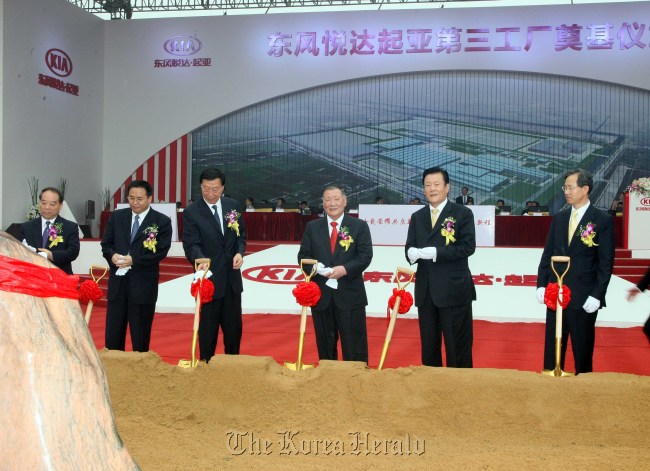Hyundai-Kia chief Chung vows to gain confidence via vehicle quality-oriented sales
Kia Motors broke ground at its new third plant in an eastern coastal province of China on Friday, aiming at doubling the company’s production capacity in the world’s largest automotive market.
On the extension of Kia’s localization strategy, the new factory will be in charge of manufacturing Chinese consumer-oriented sedans to fully reflect customers’ needs, company spokespeople said Friday.
Korea’s second-largest automaker is poised to add a variety of new lineups to the new factory’s production list in the future according to the change in market demand in China.
 |
Hyundai Motor Group chairman Chung Mong-koo (fourth from left) poses with Chinese business leaders after shoveling sand during the ground-breaking ceremony for the third factory of Kia Motors, a unit of the auto giant, in Yancheng, China, on Friday. (Hyundai Motor) |
The project of Kia, an affiliate of Hyundai Motor, is to complete building the new factory by the first half of 2014 in order to produce 300,000 units in addition to the first and second factories, all of which are located near each other in Yancheng District Economic Development Zone in Jiangsu Province.
Currently Kia produces 440,000 units, with its first Chinese factory producing 140,000 units and its second factory 300,000. The number will increase to 740,000 once the third plant is in operation.
Over 1,000 officials of Hyundai-Kia and the Chinese government crowded the groundbreaking ceremony, including Hyundai Motor Group chairman Chung Mong-koo, Communist Party Secretary of Jiangsu Province Luo Zhijun and Yancheng City Party Secretary Zhao Feng.
During the ceremony, Chung said that “Kia will emerge as a brand with great customer confidence here by pushing for high quality-oriented business policies.”
Secretary Luo said during the ceremony, “Although the world economy is in a struggle, the Chinese auto market will continue to increase since the Chinese government is currently pushing for incentive policies to raise auto consumption.”
The secretary also recalled that Kia decided to build its third plant in the time of the global financial crisis. “I am awed at chairman Chung Mong-koo’s insight to make that decision in such a difficult time.”
“Few people ensured Dongfeng Yueda Kia Automobile Company’s success when it launched business here,” Luo said in the ceremony. “But now it has grown into an automaker that represents Jiangsu Province.”
The State Information Center of China reported that sales in the Chinese auto market will expand by about 9 percent to 13 million units. The state-run institution predicted that car sales will increase to 16.7 million units in 2014 and to 18.2 million in 2015.
Mentioning its rival companies’ attempts to expand production capacity in China in large-scale, Kia stressed that the new plant underscores a speedy and timely response to the hiking demand in the world’s No. 1 car market.
In 2007 as Kia completed its second Chinese plant, the carmaker sold about 101,000 units. The number increased to 142,000 in 2008, 241,000 in 2009, 333,000 in 2010 and 433,000 in 2011.
If Kia stuck to its two-factory system in China, its market share would drop to only 2.6 percent by 2014 in the expanding market, Kia said, citing experts.
The automaker placed 7th in the Chinese auto market this year, holding a 3.6-percent market share. First launching Dongfeng Yueda Kia Motor Corporation in 2002, the company plans to sell a total of 2 million units.
Hyundai Motor is scheduled to complete its third Chinese factory next month. By 2014, Hyundai will altogether yield 1.74 million units annually.
By Chung Joo-won (
joowonc@heraldcorp.com)





![[Exclusive] Hyundai Mobis eyes closer ties with BYD](http://res.heraldm.com/phpwas/restmb_idxmake.php?idx=644&simg=/content/image/2024/11/25/20241125050044_0.jpg)
![[Herald Review] 'Gangnam B-Side' combines social realism with masterful suspense, performance](http://res.heraldm.com/phpwas/restmb_idxmake.php?idx=644&simg=/content/image/2024/11/25/20241125050072_0.jpg)

